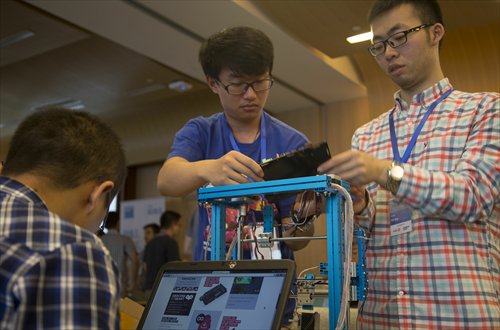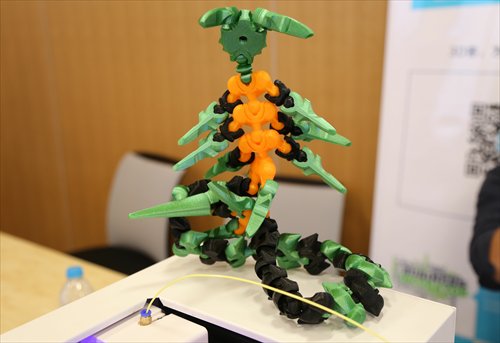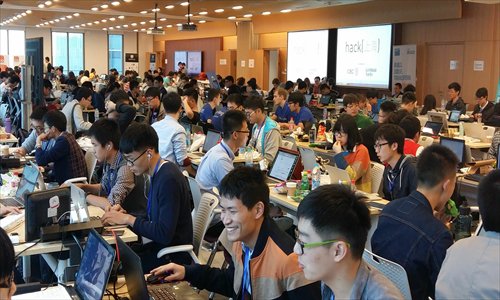HOME >> METRO SHANGHAI
Hackathon!
By Sun Shuangjie Source:Global Times Published: 2015-11-17 18:58:01
Hackathons, computer programming events which bring software developers, hardware makers and other creative thinkers together to collaborate on an intense, 24-hour tech project competition, have grown in popularity in recent years.
These coding marathons, which are not as nefarious as the term "hacker" implies, are held around the world, often hosted by technology organizations. One of Asia's more popular hackathons, HackShanghai, was started by students of New York University Shanghai (NYUS) in 2014 for Chinese and international students.
Earlier this month, the second annual HackShanghai selected 250 students from the world's top universities, including Harvard, MIT and Tsinghua, making it the first bilingual (English and Chinese) student hackathon ever held in China.
Literal buzz
The atmosphere at HackShanghai could best be described as casually intense, placing 250 brilliant minds - and their laptops - together in a single room. The literal and metaphorical buzz emanating from the event was inspiring to first-timers.
"It's very elevating, and much more interesting than working on my own at a campus laboratory," said Liam Yang, a student from Shanghai's East China Normal University (ECNU) who had never before attended a hackathon. Yang said there were at least six teams from ECNU this year, which reflects his university's growing popularity among computer science and engineering majors.
Yu Lizhong, chancellor of NYUS, made a brief welcoming speech to the participants, who were then divided into groups of four for the competition.
According to Zhang Yanming, co-director of the event, each participant was personally selected with the help of experts and specialists from NYUS's Career Development Center, who not only took into consideration the students' GPA but also their extracurricular activity experiences.
Prize winners
With prizes worth 200,000 yuan ($31,364) for the hackathon's winners, including the top three teams ranked by a jury as well as an audience's favorite voted on by participants, HackShanghai's jury came from various backgrounds, among them venture capitalists, bankers and computer engineers.
"Rolling Ball," a multi-player game app created by a team from Shanghai's Fudan University, won first prize. By monitoring data from a smartphone's accelerometer, gyroscope and other sensors, it enables users to transfer a virtual ball from one screen to the other.
Third prize went to "Know Video," a Web browser add-on that offers video previews directly on search page results. It was created by four students who first met each other the day of the event.
Multiple incentives
Tech industry insiders, including representatives from 15 start-up companies, stood by at booths to communicate with the students. To realize their project, participants could select from a wide range of advanced devices such as virtual reality glasses, 3D printers, video game consoles, sensor devices and brain computer interfaces.
Liu Qiuyang, an ECNU graduate whose team came in at the top 10 during last year's HackShanghai, decided to design for this year's event an app for a smart watch which gives notifications based on users' geographical location. Liu said that in addition to the competition, she enjoys attending the event because it provides a sneak peak at devices that have not yet been released to the public or that are typically out of a student's price range.
Song Jiaming, a senior undergraduate from Beijing's Tsinghua University, organized a student hackathon in Beijing last November. He told the Global Times that the hackathon offers a chance for students to build programs that really interest them, but usually, due to time limits, projects created during a hackathon are quite rudimentary, with most failing to qualify for further development for the marketplace.
"But there are exceptions," added Song. "I've heard cases about people starting up tech businesses based on ideas conceived during a hackathon."



These coding marathons, which are not as nefarious as the term "hacker" implies, are held around the world, often hosted by technology organizations. One of Asia's more popular hackathons, HackShanghai, was started by students of New York University Shanghai (NYUS) in 2014 for Chinese and international students.
Earlier this month, the second annual HackShanghai selected 250 students from the world's top universities, including Harvard, MIT and Tsinghua, making it the first bilingual (English and Chinese) student hackathon ever held in China.
Literal buzz
The atmosphere at HackShanghai could best be described as casually intense, placing 250 brilliant minds - and their laptops - together in a single room. The literal and metaphorical buzz emanating from the event was inspiring to first-timers.
"It's very elevating, and much more interesting than working on my own at a campus laboratory," said Liam Yang, a student from Shanghai's East China Normal University (ECNU) who had never before attended a hackathon. Yang said there were at least six teams from ECNU this year, which reflects his university's growing popularity among computer science and engineering majors.
Yu Lizhong, chancellor of NYUS, made a brief welcoming speech to the participants, who were then divided into groups of four for the competition.
According to Zhang Yanming, co-director of the event, each participant was personally selected with the help of experts and specialists from NYUS's Career Development Center, who not only took into consideration the students' GPA but also their extracurricular activity experiences.
Prize winners
With prizes worth 200,000 yuan ($31,364) for the hackathon's winners, including the top three teams ranked by a jury as well as an audience's favorite voted on by participants, HackShanghai's jury came from various backgrounds, among them venture capitalists, bankers and computer engineers.
"Rolling Ball," a multi-player game app created by a team from Shanghai's Fudan University, won first prize. By monitoring data from a smartphone's accelerometer, gyroscope and other sensors, it enables users to transfer a virtual ball from one screen to the other.
Third prize went to "Know Video," a Web browser add-on that offers video previews directly on search page results. It was created by four students who first met each other the day of the event.
Multiple incentives
Tech industry insiders, including representatives from 15 start-up companies, stood by at booths to communicate with the students. To realize their project, participants could select from a wide range of advanced devices such as virtual reality glasses, 3D printers, video game consoles, sensor devices and brain computer interfaces.
Liu Qiuyang, an ECNU graduate whose team came in at the top 10 during last year's HackShanghai, decided to design for this year's event an app for a smart watch which gives notifications based on users' geographical location. Liu said that in addition to the competition, she enjoys attending the event because it provides a sneak peak at devices that have not yet been released to the public or that are typically out of a student's price range.
Song Jiaming, a senior undergraduate from Beijing's Tsinghua University, organized a student hackathon in Beijing last November. He told the Global Times that the hackathon offers a chance for students to build programs that really interest them, but usually, due to time limits, projects created during a hackathon are quite rudimentary, with most failing to qualify for further development for the marketplace.
"But there are exceptions," added Song. "I've heard cases about people starting up tech businesses based on ideas conceived during a hackathon."

Students work on their projects at HackShanghai.

A 3D printer sponsor showcases a printed model

Two hundred and fifty students from 100 universities joined HackShanghai, the largest student hackathon in China.
Photos: Sun Shuangjie/GT and courtesy of Zhang Yanming
Posted in: Metro Shanghai